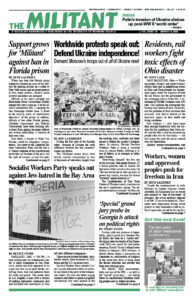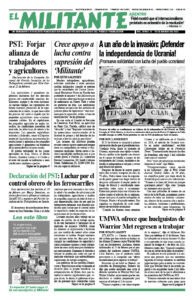When they hear that Florida prison authorities banned an issue of the Militant for printing articles on a strike by New York nurses and on recent protests in Iran, many workers, farmers, union activists and others are outraged.
Officials at the state’s privately run Blackwater River Correctional Facility banned this year’s issue no. 4 of the socialist newsweekly Feb. 1, charging the two front-page articles pose “a threat to the security, order, or rehabilitative objectives” of the prison. In addition, officials at two other Florida prisons, Charlotte Correctional and Wakulla Correctional, have been blocking subscribers from getting the paper without any written notification, a violation of their own rules.
Karl Butts, a farmer in Plant City, Florida, called the allegations “preposterous.” In a letter to the Literature Review Committee, Butts said the ban is a “blatant violation of the constitutional protections of freedom of the press and the right of inmates to read the news they choose.”
The fight against the ban is winning broad support. Timothy Frankland, a third-generation union worker in St. Paul, Minnesota, urged the committee “to reverse the ban.”
Justin Mazzola, deputy director of research for Amnesty International USA, wrote to the review committee that the two articles “merely provide information on current events related to these important national and global events.” Prisoners have the right to “maintain their connection to the outside world during their incarceration.” PEN America, Reporters Committee on Freedom of the Press and the National Coalition Against Censorship have also called on Florida prison officials to reverse the ban.
The number of prisoner subscribers to the Militant has been increasing over the last several years. There are now more than 190 inmates in 94 state and federal prisons in 28 states who subscribe, including more than 80 in 23 state facilities in Florida. While prison systems outside Florida have occasionally attempted to bar the Militant, all those attempts have been overturned.
Florida prison officials have tried to suppress the Militant nearly 50 times from 2013 to 2021. The Militant challenged every one, overturning most of them.
“There is nothing in the Militant that justifies it being banned,” said Militant editor John Studer. “Prisoners have the constitutional right to read a wide a variety of literature, to think for themselves, to form their own opinions, and we have the right to promote our point of view and reach our readers.”
Saritza Legault, Florida Department of Corrections Library Services administrator, informed David Goldstein, the Militant’s attorney, that the review committee will meet March 9 to “review” the impoundment.
Militant readers can help win support from co-workers, union officials, fellow union members and others.
Send letters to Saritza.Legault@fdc.myflorida.com or via post office mail to Florida DC Literature Review Committee, 501 South Calhoun Street, Tallahassee, FL 32399-2500. Please send a copy to the Militant.

